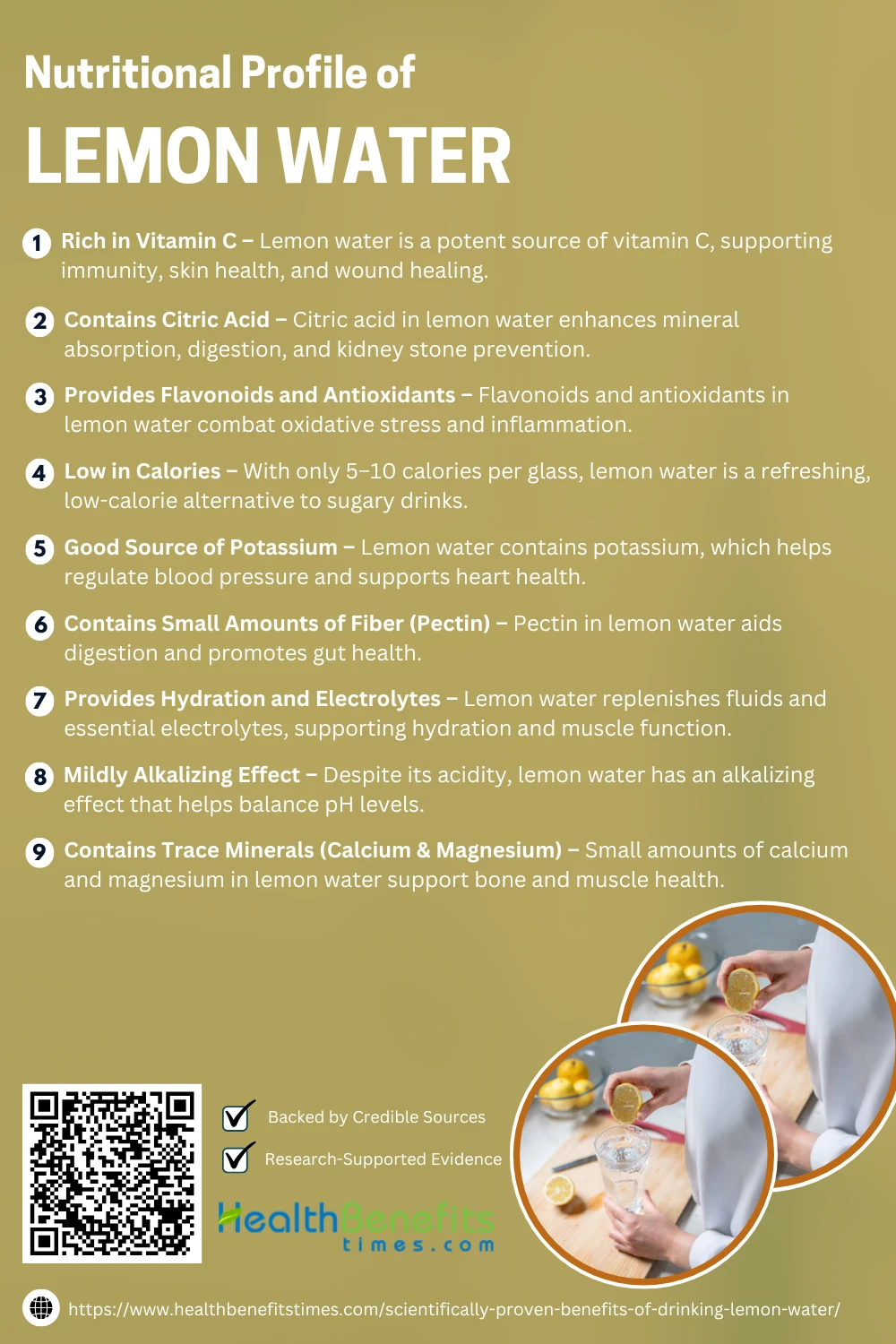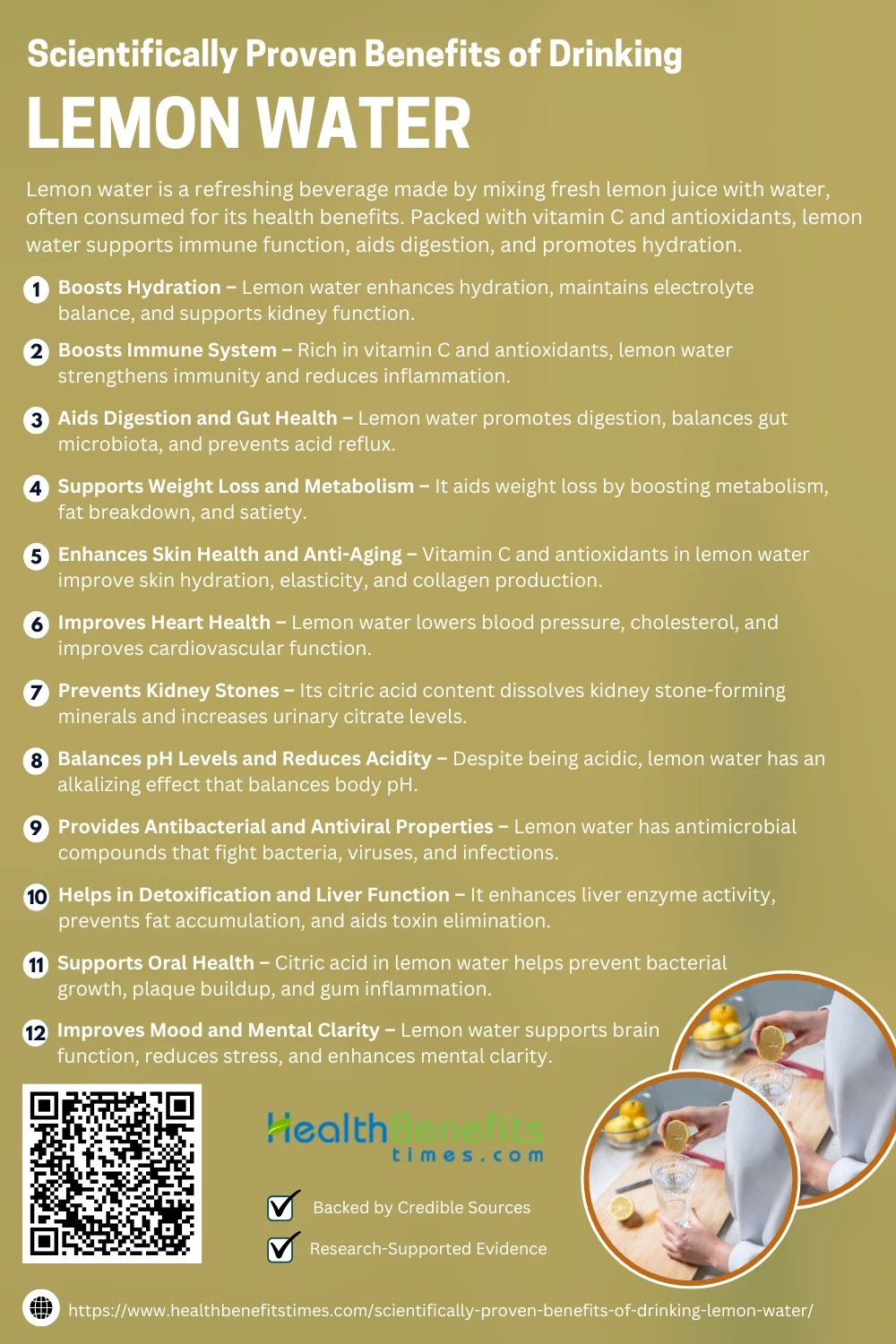- Lemon water is a refreshing beverage made by mixing fresh lemon juice with water, often consumed for its health benefits.
- Packed with vitamin C and antioxidants, lemon water supports immune function, aids digestion, and promotes hydration.
- Scientific studies suggest that drinking lemon water may help improve skin health, support weight management, and enhance overall well-being.
 Lemon water is a simple beverage made by mixing freshly squeezed lemon juice with water, providing a rich source of vitamin C, antioxidants, and other essential nutrients that offer multiple health benefits. In recent years, drinking lemon water has gained immense popularity due to its claimed health benefits, ranging from improved digestion to enhanced hydration. Scientific studies have demonstrated that lemon water can boost the immune system, largely due to its high vitamin C content, which plays a crucial role in fighting infections and reducing oxidative stress. Additionally, its citric acid content has been shown to support kidney health by preventing the formation of kidney stones.
Lemon water is a simple beverage made by mixing freshly squeezed lemon juice with water, providing a rich source of vitamin C, antioxidants, and other essential nutrients that offer multiple health benefits. In recent years, drinking lemon water has gained immense popularity due to its claimed health benefits, ranging from improved digestion to enhanced hydration. Scientific studies have demonstrated that lemon water can boost the immune system, largely due to its high vitamin C content, which plays a crucial role in fighting infections and reducing oxidative stress. Additionally, its citric acid content has been shown to support kidney health by preventing the formation of kidney stones.
Moreover, research indicates that lemon polyphenols contribute to weight management by regulating fat metabolism and improving insulin sensitivity. Studies have also linked lemon water consumption to better skin health, as its antioxidants protect against UV damage and promote collagen synthesis. Lemon water has also been identified as an effective digestive aid, helping stimulate gastric juices and promoting gut microbiota balance. Furthermore, its hydration benefits are well-documented, as the enhanced flavor encourages increased water consumption, which is vital for overall health. While there are many myths surrounding lemon water, recent clinical research supports its role in heart health, suggesting that its flavonoid compounds help reduce blood pressure and cholesterol levels. Additionally, its antibacterial and antiviral properties have been studied for their potential role in preventing infections and maintaining oral hygiene.
Nutritional Profile of Lemon Water
Lemon water is a low-calorie, nutrient-dense beverage packed with vitamins, minerals, and bioactive compounds that offer numerous health benefits. Below is a listicle of its key nutritional components based on recent scientific research.
1. Rich in Vitamin C
Lemon water is a potent source of vitamin C, a crucial antioxidant that supports immune function, skin health, and wound healing. Research highlights that lemon peel contains bioactive compounds that enhance the vitamin C content, making it an excellent natural supplement. (1) Additionally, studies on lemon essential oil nanoemulsions reveal their role in stabilizing and protecting vitamin C, ensuring its effective absorption in the body. (2)
2. Contains Citric Acid
Citric acid, a natural compound found in lemon water, plays a significant role in enhancing mineral absorption, preventing kidney stones, and aiding digestion. Research confirms that citrus fruits like lemons are rich in citric acid, contributing to their distinctive sour taste and numerous health benefits. (3) Furthermore, studies on citrus irrigation methods indicate that the citric acid concentration in lemons is directly influenced by water intake and environmental factors. (4)
3. Provides Flavonoids and Antioxidants
Lemon water is a rich source of flavonoids and antioxidants, which help combat oxidative stress and inflammation. Research highlights that citrus extracts contain high levels of flavonoids, providing protective effects against cellular damage. (5) Additionally, studies indicate that citrus pectin combined with flavonoids enhances antioxidant activity, further boosting its health benefits. (6)
4. Low in Calories
With only about 5–10 calories per glass, lemon water is an excellent low-calorie alternative to sugary beverages. Research confirms that lemon-infused products can be effectively incorporated into weight-conscious diets due to their minimal caloric impact. (7) Additionally, lemon essential oils have been used in functional food development to create refreshing, low-calorie drinks. (7)
5. Good Source of Potassium
Lemon water contains small amounts of potassium, an essential mineral that helps regulate blood pressure and maintain nerve function. Research highlights that citrus-based beverages contribute to daily potassium intake, supporting heart health and electrolyte balance. (8) Additionally, studies indicate that potassium from citrus peels can be effectively extracted, emphasizing its nutritional value in natural beverages. (9)
6. Contains Small Amounts of Fiber (Pectin)
Lemon water provides trace amounts of pectin, a soluble fiber known for its role in improving digestion and promoting gut health. Research suggests that pectin from citrus fruits enhances fiber intake, supporting microbiota balance and digestive well-being. (10) Additionally, studies indicate that citrus-based pectin improves water absorption and gut motility, making lemon-infused beverages a beneficial dietary addition. (10)
7. Provides Hydration and Electrolytes
Lemon water is an excellent hydration source, replenishing essential electrolytes like potassium, which supports muscle function and fluid balance. Research indicates that adding citrus extracts to beverages enhances hydration and electrolyte retention. (11) Additionally, studies highlight the importance of electrolytes in preventing dehydration and supporting kidney health, making lemon-infused water a beneficial alternative to plain water. (12)
8. Mildly Alkalizing Effect
Despite its acidic nature, lemon water has an alkalizing effect in the body, helping to balance pH levels and reduce acidity-related issues. Research shows that lemon juice contributes to a mild alkaline environment, which may aid digestion and overall metabolic function. (13) Furthermore, studies confirm that citrus-based drinks promote a citraturic effect, increasing urinary pH and reducing the risk of kidney stones. (14)
9. Contains Trace Minerals (Calcium & Magnesium)
Lemon water provides small amounts of essential minerals like calcium and magnesium, which support bone health, muscle function, and nerve signaling. Research indicates that lemon extracts contain vital minerals, including magnesium and calcium, that contribute to overall nutritional value. (15) Additionally, studies confirm that adding lemon to beverages can enhance the bioavailability of these trace minerals, optimizing their absorption in the body.
Scientifically Proven Benefits of Drinking Lemon Water
Lemon water is a refreshing drink packed with essential nutrients. Scientific studies highlight its benefits, including improved digestion, hydration, immunity, and skin health. Discover the science-backed reasons to start drinking lemon water daily.
1. Boosts Hydration
Lemon water is a natural way to enhance hydration by making water more palatable and encouraging fluid intake. Studies show that citrus-infused beverages, including lemon water, help maintain electrolyte balance and prevent dehydration. (16) Research also highlights that lemon water can support kidney function by increasing urine output and flushing out toxins. (12) Additionally, citrus hydration solutions have been found to improve glucose absorption and electrolyte retention. (17) Another study found that hydration from lemon-based drinks contributes to better digestion and nutrient absorption. (10) Overall, drinking lemon water is an effective and enjoyable way to maintain proper hydration levels.
2. Boosts Immune System
Lemon water is rich in vitamin C and antioxidants, which play a crucial role in strengthening the immune system. Research suggests that citrus-based beverages, particularly lemon water, enhance immune response by increasing vitamin C intake. (16) Studies show that lemon compounds help neutralize free radicals, reducing oxidative stress and inflammation. (3) Additionally, lemon water supports gut microbiota, which is closely linked to immune health. (18) Another study found that vitamin C in lemon juice helps the body combat infections more effectively. (19) Moreover, antioxidants in lemon water improve cellular immunity by promoting the production of white blood cells. (16)
3. Aids Digestion and Gut Health
Lemon water stimulates digestion by enhancing gastric juice production and supporting gut microbiota balance. Research indicates that citric acid in lemon water promotes enzyme activity, aiding in the breakdown of food. (19) Additionally, lemon polyphenols have been found to improve gut flora, fostering a healthy digestive system. Studies also highlight its ability to reduce bloating and constipation by stimulating peristalsis. (16) Moreover, its alkalizing properties help balance stomach acidity, preventing acid reflux. (3) Lastly, the hydration boost from lemon water ensures smoother digestion and efficient nutrient absorption. (12)
4. Supports Weight Loss and Metabolism
Lemon water aids weight loss by promoting satiety, enhancing metabolism, and improving fat breakdown. Research shows that lemon polyphenols regulate lipid metabolism, reducing fat accumulation. (20) Additionally, flavonoids in lemon water improve insulin sensitivity, preventing blood sugar spikes that lead to fat storage. (21) Hydration from lemon water also enhances calorie-burning efficiency by maintaining an optimal metabolic rate. (16) Moreover, citric acid in lemons has been found to boost energy production, increasing physical activity potential. (3) Lastly, its low-calorie content makes it an ideal replacement for high-sugar beverages, further aiding weight loss. (12)
5. Enhances Skin Health and Anti-Aging
Lemon water is packed with vitamin C and antioxidants, which help combat oxidative stress, reducing wrinkles and promoting youthful skin. Research highlights that lemon polyphenols improve skin hydration and elasticity, delaying signs of aging. (22) Additionally, citric acid in lemon water helps remove dead skin cells, promoting a natural glow. (16) Studies suggest that vitamin C boosts collagen synthesis, maintaining skin firmness. (18) Furthermore, antioxidants found in lemon water protect against UV-induced damage, preventing premature aging. (3) Hydration from lemon water also ensures better moisture retention, reducing skin dryness. (12)
6. Improves Heart Health
Lemon water plays a crucial role in heart health by lowering blood pressure, reducing cholesterol, and preventing arterial plaque buildup. Research suggests that flavonoids in lemon water help reduce LDL cholesterol, improving cardiovascular function. (23) Additionally, its high vitamin C content supports arterial flexibility, reducing hypertension risks. (16) Studies also show that polyphenols in lemons improve blood circulation, preventing clot formation. (24) Furthermore, hydration from lemon water supports overall cardiovascular efficiency by maintaining optimal blood volume. (25) Lastly, potassium in lemon water aids in regulating heart rhythms, reducing the risk of cardiovascular diseases. (26)
7. Prevents Kidney Stones
Lemon water is highly effective in preventing kidney stones due to its high citric acid content, which helps dissolve calcium oxalate crystals and reduce stone formation. Studies show that regular consumption of lemon juice increases urinary citrate levels, a key inhibitor of kidney stone development. (27) Research also indicates that citrus fruit intake significantly lowers the risk of kidney stone recurrence. (28) Moreover, lemon water promotes hydration, a critical factor in flushing out excess minerals before they form stones. (29) Another study found that the alkalizing effect of lemon juice helps neutralize uric acid, reducing the likelihood of uric acid stones. (30) Additionally, citric acid therapy has been recommended as a natural alternative for kidney stone prevention. (31)
8. Balances pH Levels and Reduces Acidity
Lemon water, despite its acidic nature, has an alkalizing effect on the body, helping to balance pH levels and reduce acidity. Research shows that citric acid in lemons is metabolized into bicarbonate, leading to an overall alkalizing effect in the body. (32) Studies confirm that lemon water can counteract excessive acidity caused by high-protein diets, promoting metabolic balance. (33) Moreover, lemon water has been shown to help regulate acid-base equilibrium, improving overall digestive function. (34) Another study highlights that consuming citrus-based drinks enhances urine pH, reducing the risk of acid-induced kidney stones. (35) Lastly, hydration from lemon water aids in diluting gastric acid, preventing acid reflux and promoting gastrointestinal comfort. (36)
9. Provides Antibacterial and Antiviral Properties
Lemon water contains bioactive compounds with strong antibacterial and antiviral effects, helping to prevent infections and boost immunity. Studies indicate that citrus extracts exhibit potent antimicrobial activity, inhibiting the growth of harmful bacteria and viruses. (37) Research shows that the high acidity of lemon juice disrupts bacterial cell walls, preventing infections. (38) Additionally, flavonoids found in lemon water have been reported to possess antiviral properties, reducing the replication of certain viruses. (25) Studies also suggest that the combination of citric acid and vitamin C enhances the body’s defense against pathogens. (39) Furthermore, lemon-derived essential oils are known to act as natural disinfectants, promoting oral and gut health. (33)
10. Helps in Detoxification and Liver Function
Lemon water plays a crucial role in detoxification by supporting liver function and aiding in the elimination of toxins. Research suggests that lemon juice enhances liver enzyme activity, promoting effective detoxification. (25) Studies also highlight that lemon water helps flush out harmful compounds, reducing liver inflammation. (40) Additionally, citric acid in lemons has been found to prevent fat accumulation in the liver, lowering the risk of fatty liver disease. (41) Another study confirms that consuming lemon-based detox drinks improves bile production, aiding digestion and toxin removal. (42) Furthermore, polyphenols in lemon water provide antioxidant protection, shielding the liver from oxidative stress and damage. (39)
11. Supports Oral Health
Lemon water plays a crucial role in detoxification by supporting liver function and aiding in the elimination of toxins. Research suggests that lemon juice enhances liver enzyme activity, promoting effective detoxification. (25) Studies also highlight that lemon water helps flush out harmful compounds, reducing liver inflammation. (40) Additionally, citric acid in lemons has been found to prevent fat accumulation in the liver, lowering the risk of fatty liver disease. (41) Another study confirms that consuming lemon-based detox drinks improves bile production, aiding digestion and toxin removal. (42) Furthermore, polyphenols in lemon water provide antioxidant protection, shielding the liver from oxidative stress and damage. (39)
12. Improves Mood and Mental Clarity
Lemon water has natural antibacterial properties that help maintain oral hygiene and freshen breath. Research suggests that the citric acid in lemon water inhibits bacterial growth, reducing plaque buildup and gum inflammation. (22) Additionally, lemon’s natural acidity can help prevent the growth of harmful oral pathogens that cause bad breath. (43) Studies highlight that flavonoids found in citrus fruits contribute to reducing the risk of periodontal disease. (22) Furthermore, vitamin C in lemon water strengthens gums, promoting overall oral health. (22) However, due to its acidity, it is recommended to rinse the mouth with plain water after drinking lemon water to protect tooth enamel. (22)
How to Prepare and Consume Lemon Water for Maximum Benefits
Lemon water is a refreshing, nutrient-rich drink that offers numerous health benefits. To maximize its effectiveness, follow these research-backed tips:
1. Use Fresh Lemons over Bottled Juice
Fresh lemons offer higher nutritional value than bottled lemon juice, retaining essential antioxidants, vitamin C, and natural enzymes. Research indicates that bottled juices often undergo pasteurization, reducing vitamin C content and antioxidant capacity. Additionally, studies show that bottled lemon juice may contain added preservatives and artificial ingredients that can diminish its health benefits compared to freshly squeezed lemon juice. (44) Therefore, using fresh lemons ensures a higher intake of beneficial bioactive compounds and essential nutrients.
2. Opt for Lukewarm Water Instead of Cold
Lukewarm water aids digestion, enhances nutrient absorption, and promotes better hydration compared to cold water. Research shows that warm water improves blood circulation and helps in breaking down fats more efficiently. (45) Additionally, lukewarm water is easier on the digestive system, reducing bloating and stimulating metabolism, making it more beneficial than cold water for overall health. (46)
3. Drink It in the Morning for Best Results
Drinking lemon water in the morning enhances hydration, boosts metabolism, and supports detoxification. Research indicates that consuming fluids early in the day jumpstarts digestive processes and improves overall hydration levels. (47) Additionally, morning consumption of lemon water has been linked to better energy levels and improved cognitive function, making it an ideal start to the day. (48)
4. Add a Pinch of Himalayan Salt for Electrolyte Balance
Himalayan salt contains essential minerals like potassium, magnesium, and sodium, which help maintain electrolyte balance and hydration. Research suggests that adding a small amount of Himalayan salt to water can improve mineral absorption and support optimal hydration levels. (49) Additionally, studies indicate that rock salt varieties, such as Himalayan salt, help maintain pH balance and improve cellular function. (50)
5. Avoid Adding Sugar or Artificial Sweeteners
Adding sugar or artificial sweeteners to lemon water can negate its health benefits by increasing calorie intake and disrupting metabolism. Research highlights that excessive consumption of artificial sweeteners may lead to metabolic disorders and gut microbiota imbalances. (51) Additionally, studies suggest that substituting sugar with artificial sweeteners in beverages can have mixed effects on weight control and may not always promote better health outcomes. (52)
6. Use a Straw to Protect Tooth Enamel
Drinking acidic beverages like lemon water can erode tooth enamel over time, making a straw a useful tool to minimize direct contact with teeth. Research suggests that using a straw significantly reduces acid exposure, lowering the risk of enamel demineralization. (53) Additionally, studies indicate that frequent exposure to acidic drinks without protection can lead to dental sensitivity and increased cavity formation. (53)
7. Enhance with Mint, Ginger, or Honey for Added Benefits
Adding mint, ginger, or honey to lemon water enhances its nutritional profile and medicinal properties. Research highlights that ginger improves digestion and reduces inflammation, while honey provides antibacterial benefits and enhances immunity. (54) Additionally, studies suggest that mint aids digestion and refreshes breath, making lemon water even more effective for overall wellness.
Potential Side Effects and Precautions
While lemon water provides numerous health benefits, it can also lead to some side effects if consumed excessively. Below are potential risks and precautions to consider:
1. Erosion of Tooth Enamel
Frequent consumption of lemon water can lead to tooth enamel erosion due to its high acidity. Research indicates that citric acid in lemons softens enamel, making teeth more vulnerable to decay and sensitivity. (55) Additionally, studies show that prolonged exposure to acidic beverages accelerates dental erosion. (56) The acid in lemon juice has been found to weaken enamel over time, increasing susceptibility to damage. (57) A study also found that frequent intake of citrus juices contributes to higher erosion rates in children’s teeth. (58) To minimize damage, experts recommend using a straw or rinsing the mouth with water after consumption. (59)
2. Increased Risk of Acid Reflux and Heartburn
Drinking too much lemon water can exacerbate acid reflux and heartburn due to its high acidity. Research suggests that acidic foods, including lemons, can trigger gastroesophageal reflux symptoms. (60) Studies indicate that lemon water can activate pepsin, an enzyme linked to acid reflux and throat irritation. Excessive consumption has also been associated with increased gastric acidity, worsening symptoms of acid-related conditions. Studies highlight that individuals with sensitive stomachs or GERD should limit acidic beverage intake to prevent discomfort. Moreover, experts recommend drinking lemon water in moderation and pairing it with alkaline foods to balance acidity.
3. Potential Stomach Discomfort and Ulcers
Consuming excessive lemon water can irritate the stomach lining, leading to discomfort, bloating, and ulcers. Research highlights that citric acid in lemons can trigger gastric pain and worsen pre-existing ulcers. (61) Additionally, studies indicate that excessive citrus consumption may cause an imbalance in stomach acid secretion, aggravating acid reflux and gastritis. (62) Another study found that citric acid intake may increase gastric motility, leading to nausea and discomfort in some individuals. (63) Researchers also note that individuals with a history of ulcers should limit acidic foods to prevent irritation. Lastly, a study suggests that lemon water may contribute to increased stomach acid production, which can lead to further digestive discomfort. (64)
4. Frequent Urination and Dehydration Risks
Lemon water has diuretic properties that can increase urination, leading to potential dehydration if not consumed with adequate water intake. Research shows that citric acid can enhance urine production, depleting essential electrolytes. (65) Additionally, studies suggest that excessive fluid loss from frequent urination can disrupt the body’s hydration balance, increasing dehydration risks. (66) Another study highlights that consuming acidic beverages in large quantities may cause fluctuations in urinary pH, further affecting hydration levels. (67) Research also confirms that dehydration from excessive lemon water intake can contribute to kidney stone formation due to increased urinary concentration. (68) Lastly, excessive citric acid consumption has been linked to reduced sodium retention, increasing dehydration risks in individuals engaging in physical activity.
5. May Interact with Certain Medications
Lemon water can interfere with drug metabolism, potentially affecting the absorption and efficacy of certain medications. Research highlights that citrus compounds, including those in lemons, can inhibit liver enzymes responsible for drug breakdown, leading to altered medication effects. (69) Additionally, studies show that citrus flavonoids can interact with prescription drugs, modifying their pharmacokinetics. (62) Another study found that citrus juices, including lemon, may affect the bioavailability of medications by altering gastric pH. (70) Research also indicates that excessive citrus intake can interfere with medications used to manage blood pressure and cholesterol. (71) Lastly, experts suggest that individuals taking specific medications should consult their doctor before consuming large amounts of lemon water. (72)
Precautionary Measures:
- Use a straw to minimize contact with teeth.
- Limit intake if you have acid reflux or stomach ulcers.
- Drink in moderation to avoid dehydration and excessive urination.
- Consult a doctor if you are on medication that may interact with citrus compounds.
Common Myths and Misconceptions about Lemon Water
Lemon water is often associated with numerous health claims, but not all of them are backed by scientific evidence. Here are some common myths debunked by research:
1. Myth: Lemon Water Detoxifies the Body
Many people believe that drinking lemon water flushes toxins from the body, but detoxification is primarily handled by the liver and kidneys. While lemon water supports hydration and may aid digestion, it does not have a direct detoxifying effect. Research confirms that hydration is key for toxin elimination, but lemon water itself does not enhance the process significantly. (73)
2. Myth: Lemon Water Can Prevent or Cure Diseases
Lemon water is often promoted as a cure for colds, cancer, and infections due to its vitamin C content. While vitamin C is essential for immune health, lemon water alone is not a medical treatment or preventative cure. Studies indicate that a balanced diet with a variety of nutrients is necessary to maintain strong immunity and overall health. (74)
3. Myth: Lemon Water Promotes Significant Weight Loss
Some claim that drinking lemon water leads to rapid weight loss. While it can support weight management by reducing calorie intake when replacing sugary beverages, it does not directly burn fat. Research suggests that hydration and diet adjustments play a bigger role in weight loss than lemon water itself. (73)
4. Myth: Lemon Water Makes the Body Alkaline
It is widely believed that lemon water has an alkalizing effect on the body. While it may temporarily increase urine pH, it does not alter blood pH, which is tightly regulated by the body. Scientific studies confirm that dietary choices have little effect on the body’s internal pH balance. (75)
5. Myth: Lemon Water Provides All the Daily Vitamin C You Need
Although lemons are a good source of vitamin C, a single glass of lemon water does not contain enough to meet daily nutritional requirements. The recommended daily intake for vitamin C is around 75–90 mg for adults, and lemon water typically provides only a small portion of this. Research highlights the need for a well-rounded diet rich in fruits and vegetables for sufficient vitamin C intake. (76)
6. Myth: Lemon Water is Always Good for Digestion
While some people find that lemon water helps digestion by stimulating stomach acid production, excessive consumption can cause acid reflux, bloating, and stomach discomfort. Studies show that citric acid can irritate the stomach lining, particularly for those with pre-existing digestive issues like acid reflux or ulcers. (80)
7. Myth: Drinking Lemon Water on an Empty Stomach Increases Benefits
A common belief is that drinking lemon water first thing in the morning maximizes its health benefits. However, research indicates that the time of day does not significantly impact its effects. The key benefits of lemon water—hydration, vitamin C intake, and digestion support—remain the same regardless of when it is consumed. (78)
8. Myth: Lemon Water Has No Side Effects
Though often considered harmless, excessive consumption of lemon water can lead to side effects such as tooth enamel erosion, acid reflux, and increased stomach acidity. The citric acid in lemons can wear down tooth enamel over time, leading to sensitivity and dental problems. Studies confirm that people should drink lemon water in moderation and rinse their mouth afterward to protect their teeth. (79)
Conclusion
Drinking lemon water offers a range of scientifically backed health benefits, making it a simple yet powerful addition to your daily routine. Rich in vitamin C and antioxidants, it helps boost the immune system, improve skin health, and support digestion. Its alkalizing properties may aid in balancing the body’s pH levels, while its natural diuretic effect promotes kidney health and detoxification. Additionally, lemon water can contribute to hydration, weight management, and heart health by supporting healthy blood pressure levels. While it is not a cure-all, incorporating lemon water into a balanced diet can enhance overall well-being and provide a refreshing way to stay hydrated.






